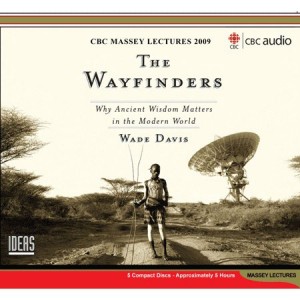Module #2
Site#5
I have included this book as I have found the authors perspective on global cultural diversity unsurpassed. Author Wade Davis an ethnographer and self described story-teller has travelled widely and shares his experiences of vastly different cultures from a global perspective. He has made his home base in central BC and has gained a respectful reputation among the Tahltan First Nations peoples as he has contributed to the opposition of development in the ‘Sacred Headwaters’ of the Stikine, Nass and Skeena rivers. Davis argues that globalization does not create harmony and integration among all groups. Instead he says, in many places it has wiped away languages, cultures and “visionary wisdom” (p.201)
Davis, W. (2009) Wayfinders Why Ancient Wisdom Matters in the Modern World. Toronto, Ontario: House of Anansi Press.
